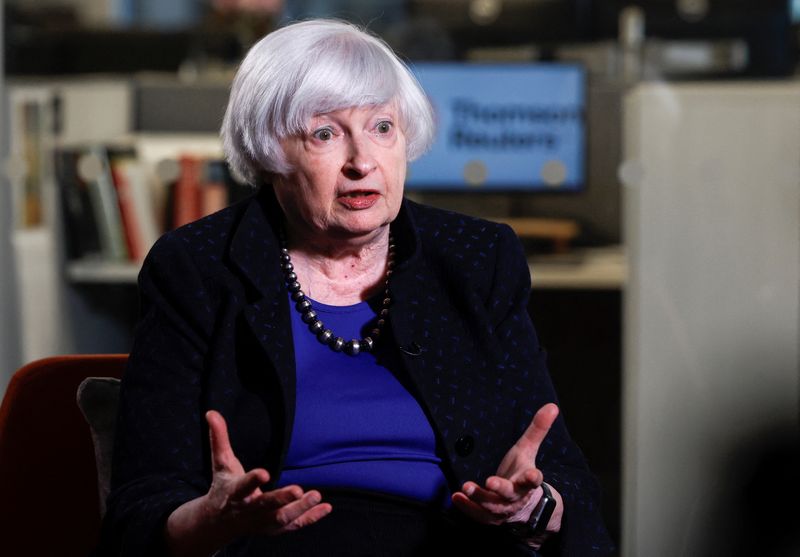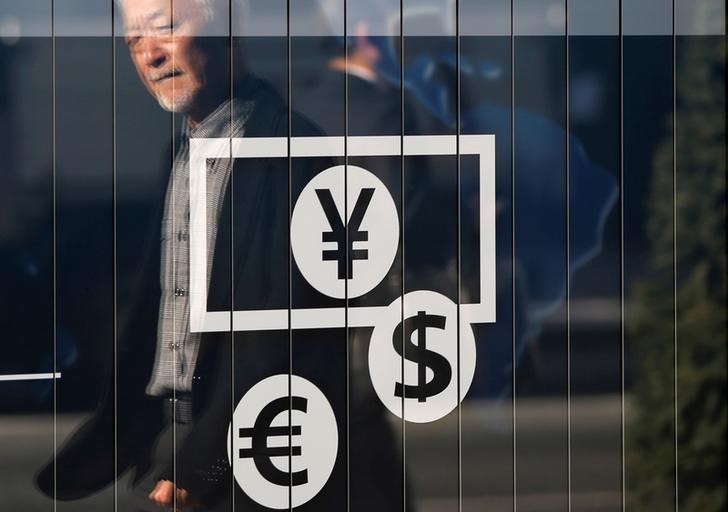By David Lawder and Andrea Shalal
WASHINGTON (Reuters) – U.S. Treasury Secretary Janet Yellen told Reuters on Friday that the U.S. is reviewing further sanctions on “dark fleet” tankers and would not rule out sanctions on Chinese banks as the country targets Russian oil revenues and access to wants to reduce foreign stocks. to fuel the war in Ukraine.
Yellen said in an interview that the U.S. and its allies could also consider lowering their oil price ceiling of $60 a barrel for Russian oil, which would ban Western insurance and maritime services on cargoes above that level.
The Treasury Department has already sanctioned individual tankers and their owners for operating above the price ceiling and can do more in this area, Yellen added, proposing additional measures in the five weeks before she leaves office.
“There are a number of possibilities here. We’re not anticipating sanctions, but we’re always looking at oil revenues and if we can find ways to further damage Russian oil revenues, I think that would strengthen Ukraine’s hand. That remains the case. on our list,” Yellen said.
Earlier this week, Yellen said weakness in the oil market presents an opportunity for more sanctions. The benchmark was trading at $74.50 a barrel on Friday, up from $85.57 when the $60 limit was set in December 2022.
President Joe Biden’s administration is rushing to boost support for Ukraine before President-elect Donald Trump takes office on Jan. 20, given the Republican leader’s frequent complaints about the costs of U.S. aid to Ukraine.
CHINESE BANKING
U.S. Treasury officials continue to hold discussions with their Chinese counterparts about efforts to track activities of financial institutions that could facilitate transactions related to Russia’s war effort. Yellen said these discussions have been helped by efforts over the past two years to rebuild economic and financial communications between the US and China.
“I would absolutely not rule out that we would impose sanctions on an individual bank if we had the necessary level of evidence to impose sanctions,” she said. “But we also have a channel where we can discuss specific concerns, and sometimes that can be enough.”
She said warnings to China’s larger banks have been successful, leaving them “very wary” of sanctions that would cut them off from dollar-based transactions. About a year ago, Biden gave the Treasury Department the authority in an executive order to impose secondary sanctions on financial institutions that facilitate war-related transactions.
As the Russian economy becomes more dominated by military production, it becomes increasingly difficult to distinguish between strictly commercial and war-related deals.
“Authorities in China recognize that our use of these sanctions would pose a serious threat with very negative consequences,” Yellen said. “They want to trade with Russia, but they don’t want their banks sanctioned.”
COMMUNICATION CHANNELS
Yellen said the final meeting of the US-China Financial Working Group would take place next week in the northeastern Chinese city of Tianjin, but that sanctions were unlikely to be a major component. Instead, it will focus on financial stability issues, including ‘tabletop’ exercises on how to deal with potential financial crises.
Yellen said it was important for the Trump administration to have open channels of communication with China, adding: “I don’t think you can just have leader-to-leader meetings. The relationship needs to be developed at senior official level, and we have worked constructively on many things.”
While the dialogue has not changed China’s state-led, export-driven economic model, it has allowed the US to explain actions such as the application of high tariffs on electric vehicles.
Asked about a Reuters report this week that Beijing is considering weakening its yuan to counter Trump’s tariff plans, Yellen said China has “done the exact opposite” in recent years, increasing the value of the yuan against the dollar to increase. That assessment was detailed in the Treasury Department’s most recent semiannual currency report, which found no evidence of manipulation by major U.S. trading partners.
She declined to comment on Beijing’s specific currency plans but said the U.S. Treasury Department has tools to respond forcefully to currency manipulation. Bessent is expected to oversee the Treasury Department’s next currency report, due in April.

“I won’t be here, but I suspect the Treasury Department will continue to push back if it thinks there is currency manipulation,” Yellen said.
Peter Navarro, Trump’s appointed White House trade adviser, also told Reuters earlier on Friday that Trump’s Treasury Department would not look “fondly” on attempts by U.S. trading partners to manipulate their currencies.


